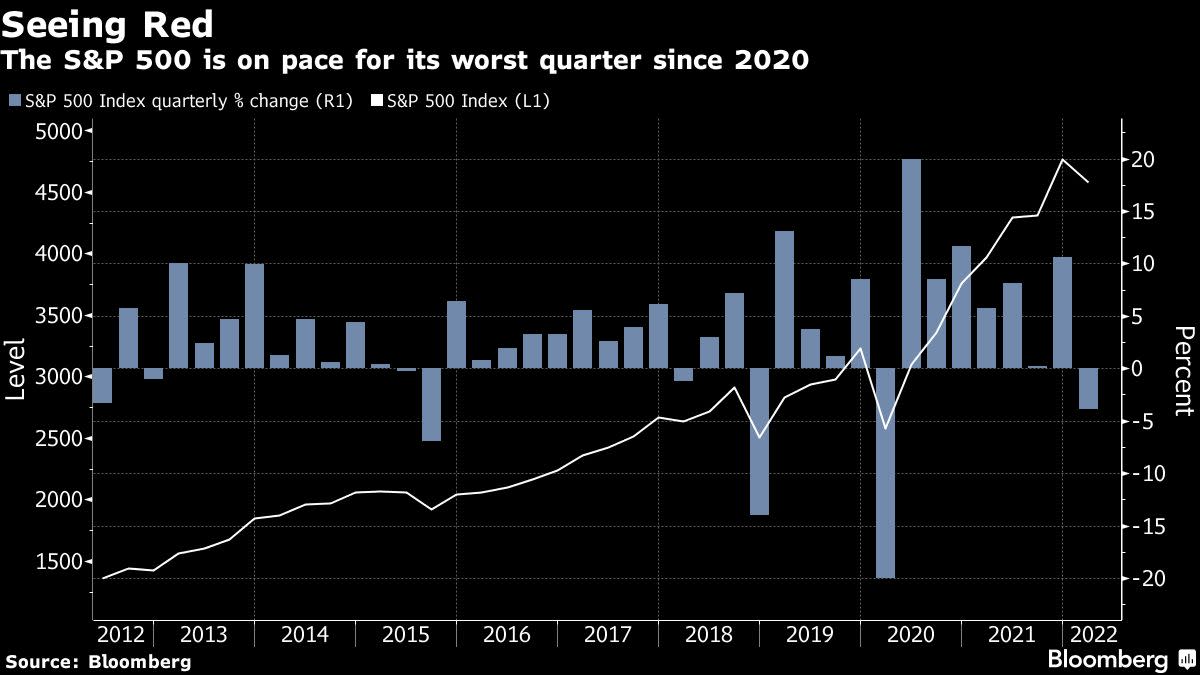
(Bloomberg) — Stocks are still in a bull market, the U.S. isn’t headed toward a recession anytime soon and the Federal Reserve is more likely than not to orchestrate a soft landing, according to UBS Asset Management’s Jeremy Zirin.
“The risk-reward from here is fairly balanced,” said Zirin, senior portfolio-manager and head of private client U.S. equities at the firm, which has approximately $1.2 trillion in assets under management. “Generally, you don’t see the U.S. equity market fall into a bear market unless you do have a recession, so I think the recessionary risks may have risen, but the biggest risks to the outlook, in my view, still appear to be fairly manageable.”
There’s a spirited debate among strategists on Wall Street over the current state of the stock market and whether a low from the recent selloff has been formed — or whether the rally of the past two weeks might be nothing more than a bear-market trap. It’s not hard to find reasons for caution — the war in Ukraine has upended the commodities market while the Fed’s push to curb red-hot inflation has spurred concern about a recession.
But the central bank is “more likely than not to be successful in orchestrating a soft landing,” Zirin said, referring to the idea the Fed could raise interest rates enough to douse inflation without maiming the jobs market or the economy. He says economic momentum was good coming into this rate-hiking cycle and the U.S. consumer — with significant excess savings — is still in good shape. Meanwhile, American companies have very little exposure to Russia and the U.S. economy is less energy-intensive compared with prior oil shocks.
Even with a nearly 5% gain this month, the S&P 500 is closing out its worst quarter since March 2020, a stretch that marked the onset of the pandemic in the U.S. A decline on Thursday would be the gauge’s 35th down day this year, the greatest number of first-quarter drawdowns since 1984, according to data compiled by Bloomberg. In fact, few areas of the market have been able to catch a bid since the start of 2022. Stocks have suffered — as have Treasuries and investment-grade bonds.
But Zirin says “we do have, still, runway here.” Equity investors don’t typically have to worry about the Fed’s first rate hike. Plus, there’s validity to the view that stocks can help offset “the deleterious effect of inflation,” because they generate real cash-flows.
Though tech stocks are among the best-performing over the past month, they tend to be sensitive to interest-rate moves. “I don’t think this is a sustainable rally in growth stocks relative to value stocks,” Zirin said. Many names sported oversold conditions ahead of the bounce and “some of it is even hard to explain as to why we’ve seen the snap-back in some of these names in the context of interest rates continuing to rise.”
Zirin says value stocks look inexpensive relative to growth ,and as interest rates continue to rise, he expects the valuation premium afforded to the latter group to shrink.
Other industries he likes:
- Financials: the sector has underperformed recently due to greater concerns around growth and the yield-curve flattening. But in his base-case scenario of the economy remaining resilient, financials could perform well as interest rates rise.
- Energy: oil prices are likely to remain elevated in the near term and the sector looks inexpensive when looked at using certain measures. Even before oil prices spiked higher following Russia’s invasion of Ukraine, energy prices were rising due to an improvement in core fundamentals.
- The so-called reopening-trade should do well thanks to pent-up demand for travel and service-oriented activities. Commercial aerospace companies could benefit.
©2022 Bloomberg L.P.